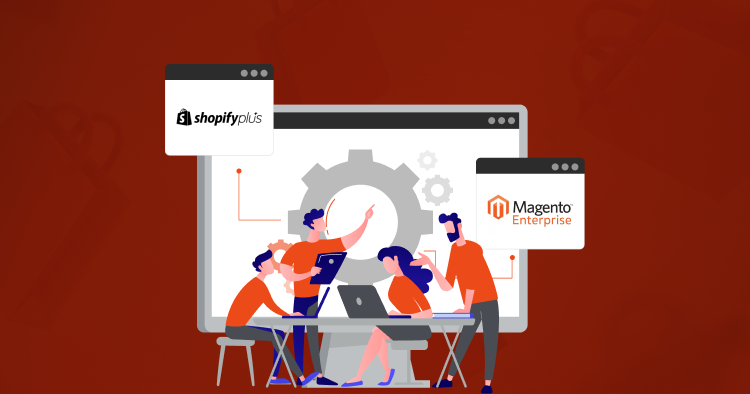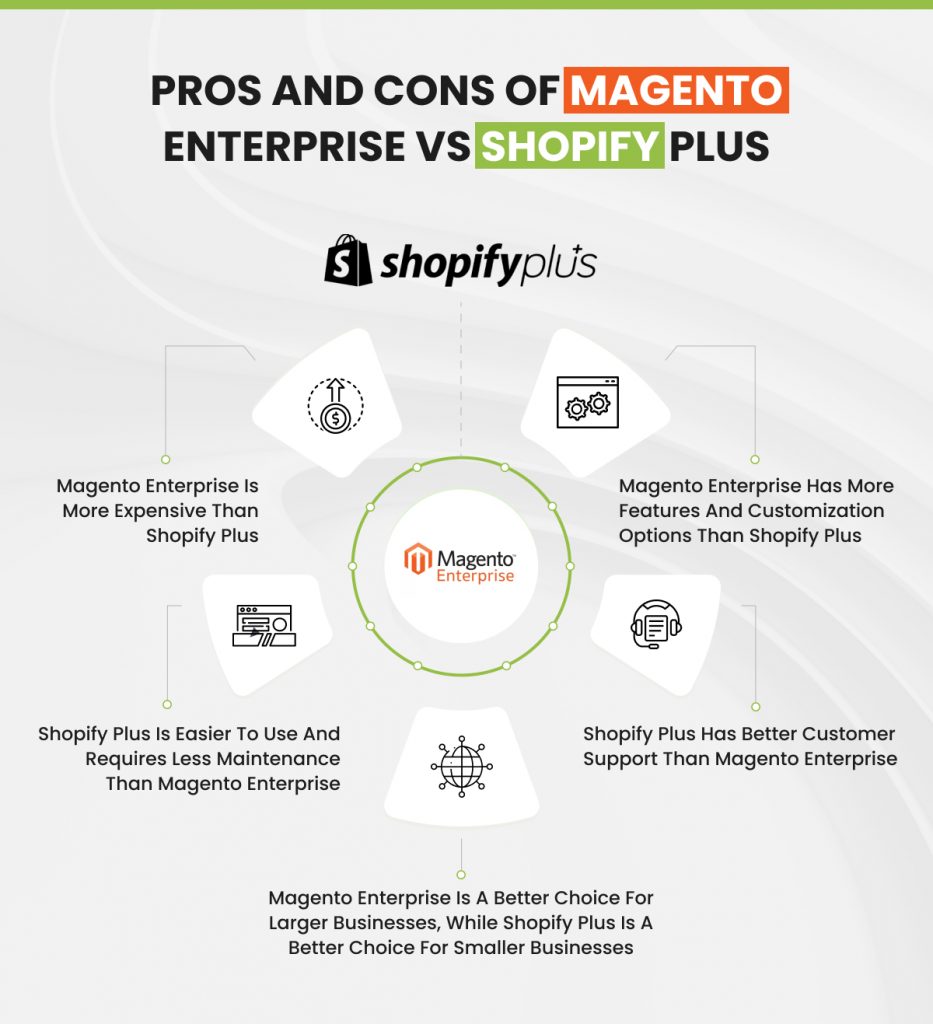Magento Enterprise Vs Shopify Plus: Which is better?
Last Updated | April 9, 2024
Table of Contents
Why are eCommerce Platforms so Important?
The 21st century has seen a rise in digitization. Especially during COVID-19, we have all found ourselves more drawn to eCommerce than ever before. Every web-based shopping site – huge or little – follows this construction. Any webpage where you can buy products available to be purchased over the web is considered a web-based business site.
This article features the importance of eCommerce platforms and moves on to presenting the in-depth comparative analysis you’ve been waiting for: Magento Enterprise vs Shopify Plus. Our experts will cover subjects such as pricing, scalability, features as well as user-friendliness, multi-store management, and hosting systems.
1. Web-based Business Helps You Reduce Your Costs
To have an online store, it isn’t required that you have every one of your products displayed in an actual, physical space. Indeed, there are various business organizations that operate online where they just show all their inventory through their eCommerce platform.
This infers not only saving by not paying to rent a workspace but also includes evading additional expenses such as power, the Internet, and so forth. During the pandemic, many store owners found themselves moving to the digital alternative as many countries went under quarantine.
2. Internet Business Helps Businesses Go Global
Connected to our previous section, an eCommerce platform permits you to put your products available to be purchased anyplace on the international market. Your customers won’t need to venture out to where you are to see what your products have to bring to the table.
In case you are running an actual, physical store, it will be tied down, or restricted to, one geographical zone, yet possessing an eCommerce site will offer you the chance to expand your business. It’ll offer your products to customers around the entire world, paying little heed to the distance and time region.
Moreover, this takes out a wide range of geographical and language barriers. Your online business can be converted into various languages permitting customers to better understand your product.
3. Your Online Store Will Stay Open Around the Clock
Yet another one of the incredible importance of eCommerce that online retailers can benefit from is that store timing is now all day, every day— throughout the year. This is due to the fact that eCommerce stores are open 24 hours per day, 7 days seven days, contrasted with the standard stores.
Along these lines, retailers can build their deals by boosting their number of requests. Nonetheless, it is likewise useful for customers as they can buy products and administrations at whatever point they need regardless of whether it is midnight or early morning.
4. Work on the Image of Your Business
Among the benefits of having an eCommerce business is that it incorporates working on the reputation of your business organization. Offering a decent online sale website to customers will give your organization an extraordinary corporate appearance.
Not only will it end up being exceptional, yet it will show interest in working with the customer, putting their comfort first. For instance, it keeps you from going to the actual spot of offer and permits you to look at costs from home. Moreover, on account of what we have referenced as loyalty or customer input, you can even carry out enhancements in your products that customers will esteem positively.
Magento Enterprise vs Shopify Plus: Overview
Magento Enterprise vs Shopify Plus, the best two platforms for big business brands, are mostly used for high-volume deals. They are frequently set in opposition to each other for platform superiority, despite the fact that, in actuality, they share very little for all intents and purposes.
Shopify Plus is the enterprise release of Shopify, offering admittance to a lot more new features, integrations, your store’s fundamental code, devoted support options than Shopify. In any case, Shopify Plus features and dashboard are just about as same as Shopify. Some of the most notable Shopify Plus customers are Nestle, Hawkers, Kylie Jenner, Budweiser, PepsiCo, Current Body, Gymshark, Protein World.
Launched in 2007, Magento Enterprise has an impressive customer portfolio of brands including; Coca-Cola, Ford, and Olympus (just to give some examples). Magento was obtained by Adobe Inc in May 2018 for $1.68 Billion USD. Since 2020, there have been 6,309 live locales on Magento Enterprise, with 1,691 in the Top 1M.
Magento Enterprise is an accomplished eCommerce platform best suited for fast and savvy website development, consolidating out-of-the-case functionalities, venture execution and scale, and incredible business apparatuses to keep you in front of progressively complex eCommerce. Magento is also called an open-source internet eCommerce platform and offers a free and a paid version of its foundation since its origin. Thus, with these clear advantages over Shopify Plus, the alternative wins this category in the Magento Enterprise Vs Shopify Plus debate.
Want to know more about Magento Enterprise? Contact Folio3, the world’s foremost Magento web development services.
| Feature/Aspect | Magento Enterprise | Shopify Plus |
|---|---|---|
| Platform Type | Self-hosted | Hosted |
| Customization | Highly customizable | Limited customization options |
| Scalability | Highly scalable | Highly scalable |
| Performance | Requires good hosting for speed | Generally fast and reliable |
| Ease of Use | Steeper learning curve | User-friendly |
| Cost | Expensive | Expensive |
| Extensions/Plugins | Extensive marketplace | Limited marketplace |
| Security | Highly secure | Highly secure |
| Support & Community | Strong community, paid support | Strong community, 24/7 support |
| Updates & Maintenance | Requires manual updates | Automatic updates |
| Hosting & Infrastructure | Self-hosted, requires setup | Fully managed |
| Mobile Responsiveness | Customizable | Mobile optimized |
| Multi-Channel Selling | Requires extensions | Built-in multi-channel selling |
| Payment Gateways | Wide range of options | Limited options |
| SEO & Marketing Tools | Extensive tools available | Built-in tools |
| Inventory Management | Advanced features | Basic features |
| Analytics & Reporting | Advanced analytics | Built-in analytics |
Magento Enterprise:
- Platform Type: Magento Enterprise is a self-hosted platform which requires users to manage their own hosting.
- Customization: Magento Enterprise offers high levels of customization, making it suitable for complex e-commerce needs.
- Cost: It is considered to be on the higher end in terms of pricing, with costs associated with hosting, development, and maintenance.
- Extensions/Plugins: Magento has a vast marketplace for extensions and plugins, allowing for extensive customization and functionality.
Shopify Plus:
- Platform Type: Shopify Plus is a hosted platform, which means Shopify takes care of the hosting and infrastructure.
- Ease of Use: Shopify Plus is known for its user-friendly interface and ease of use, making it suitable for businesses without extensive technical knowledge.
- Cost: Shopify Plus is also on the higher end in terms of pricing but includes hosting and infrastructure in the cost.
- Multi-Channel Selling: Shopify Plus offers built-in multi-channel selling features, making it easier for businesses to sell across different platforms.
Both Magento Enterprise and Shopify Plus are highly scalable and secure platforms suitable for medium to large businesses. The choice between the two largely depends on the specific needs and technical expertise of the business. Magento Enterprise offers more flexibility and customization options but requires more technical knowledge, while Shopify Plus is more user-friendly and comes with built-in features suitable for businesses looking for a more straightforward solution.
Magento Enterprise vs Shopify Plus: Features
Next in this Magento Enterprise Vs Shopify Plus argument, well discuss the kinds of features and facilities each eCommerce platform arms its users with.
Most would agree that Shopify Plus features and abilities are like Magento Enterprise — both deal all that you need to make an eCommerce store for both infant and large-scale businesses.
Notwithstanding, every platform has hegemony in different areas.
Basically, Magento has more local features that you can tweak, though Shopify has more application and script integrations. See below for a breakdown of Magento Enterprise Vs Shopify Plus features and facilities.
Magento Enterprise Features
The Magento Enterprise features that set it apart from other eCommerce platforms are its multi-shop and multi-source inventory capacities.
- The platform upholds business organizations that need to deal with various warehouses all over the country or even across the globe.
- Magento obliges B2B business organizations with the capacity to utilize the same inventory catalog for numerous shops, customers and sell at various price- points, similar to discount and retail pricing, for instance.
- Worldwide currencies, security, analytics reports, application integrations, and other essential features are incorporated into Magento Enterprise, be that as it may, customers can also benefit from full customizability. The base code of your Magento shop can be modified to suit your business’ interesting necessities.
- The customization of Magento Enterprise stores implies that setting up and keeping up with your eCommerce store will be more costly and tedious than Shopify arrangement. As a PaaS, the platform requires your own web hosting too, which only adds to the expense (except if you’re utilizing Magento Commerce Cloud). However, with the right support, you can make the best out of this platform. Folio3 has been offering its services to clients all over the globe for the last 15 + years. If you’re looking for Magento Enterprise development services, get in touch with us to leverage this extensive experience.
Shopify Plus Features:
- While Shopify Plus features do exclude the option to customize your shop’s base code, customers actually get an amazing and proficient platform, and the lack of upkeep permits you to zero in additional time and money on different parts of your business.
- Just because a Shopify Plus shop’s base code can’t be changed doesn’t mean it’s not adaptable.
- One more important Shopify Plus feature is the platform’s interface for data reports, which makes running analytics reports an easy-to-use measure. Shopify Plus customers approach each sort of report that Shopify offers, which considers further knowledge into your business.
Magento Enterprise vs Shopify Plus: Multi-Store Management
Fortunately, online business owners are now ready to make multiple stores on both Magento Enterprise Vs Shopify Plus.
Magento’s multi-store management is, by all accounts, better than Shopify Plus. From only one interface, you can oversee multi-brand, regional stores, and all B2C/B2B stores. Compared to Shopify Plus, Magento Enterprise upholds the facilities below:
- Expanding your store: Magento draws no line for the number of additional stores you can make. It assists you with building different sites for a unique brand or even numerous brands. Product lists can be shared across various sites, stores, and store views, and you can, without much of a stretch, make changes at distinct levels. This feature is inaccessible on Shopify Plus, in spite of the fact that it is fundamental for storekeepers with huge product lists shared across many websites.
- Local Prices: If your business is running internationally, there are many reasons why you need to set diverse product costs in different areas. It can shift a lot due to inventory expense, taxes, competitors, and so forth. You would prefer not to just change over to one more cash dependent on an unfamiliar conversion scale like in Shopify Plus.
- Multi-source Inventory (MSI): This is an inherent facility since the launch of Magento 2.3 on Magento Enterprise as well as on Magento Open Source. You can set up your own inventories, sources, marketable amount, execution, and partial shipment. Besides, Magento has its own Source Selection Algorithm to streamline the activity of your inventory.
As a future storekeeper on Shopify Plus, you would be keen on the accompanying provisions:
- Currency Converter: Only stores utilizing Shopify Payment can utilize this option. The conversion expense will be added to the last price and consequently changed over-dependent on the unfamiliar conversion standard. Shockingly, it implies that you can’t set up various costs for a product in isolated areas.
- Multi-Warehouse: Like Shopify, Shopify Plus permits you to set up numerous areas to follow your inventory and satisfy your orders productively. You can just have 4 areas on the Basic Shopify plan; however, the greatest number in Shopify Plus would be 20.
In this opposition between Magento Enterprise Vs Shopify Plus, Magento Enterprise is the undeniable champ with regards to multi-store executives. Regardless of how huge your image is, you can continue extending without meeting any impediments.
Magento Enterprise vs Shopify Plus: Hosting & User-Friendly Customization
Magento is a self-hosted platform that requires a robust server to handle Magento’s large resources, which can add operating costs and complexity. Even so, the ease of modification is a significant advantage. You own the code, meaning you can change everything and anything you want. You play the game with your own rules. If you want more information on Magento Enterprise development services, get in touch with our certified experts at Folio3.
Shopify Plus is a fully hosted cloud solution; Software As A Service (SaaS). SaaS provides notable savings as it eliminates the upfront cost of purchase/installation, as well as ongoing costs like maintenance and upgrades.
However, this also means that, in return, you do not have access to the code that runs your site, and therefore you have less flexibility when it comes to customization.
Read Also Shopify Versus Shopify Plus
Magento Enterprise vs Shopify Plus: Scalability
In the next part of the Magento Enterprise Vs Shopify Plus debate, we’ll discuss the subject of scalability. Scalability refers to the ability of a business to grow with time, adjusting to changing market conditions.
Shopify Plus flaunts astounding scalability since it’s a cloud-based platform. You will naturally gain access to more transfer speed, inventory piling, and figuring assets as you need them – with no mediation required from you or your chairmen. It utilizes a blend of AWS (Amazon Web Services) and Google Cloud Platform to have eCommerce sites.
Magento Enterprise is basically the same however has a slight edge over Shopify Plus. It’s truly scalable since it’s facilitated utilizing Adobe’s cloud framework, which is based on AWS.
You can likewise have limitless stores with Magento Commerce. In contrast to Shopify, there is no extra charge for doing as such, so Magento Enterprise is a superior choice in the event that you have an exceptionally huge arrangement of brands and eCommerce stores to oversee. Multi-cash and multi-language support are likewise incredible in Magento Commerce, so you can keep on extending past your home country.
Magento Enterprise vs Shopify Plus: Pricing
Shopify Plus begins at $2,000/month, and relying upon the volume of your general deals; it might increment in cost. There could be no other secret expenses or additional products – what you see is the thing that you pay.
Magento Enterprise is comparative. It’s evaluated dependent on your Gross Merchandise Value (GMV) and Average Order esteem (AOV). The more you sell, the more you’ll pay – since higher deals mean higher asset usage.
Conclusion
Analyzing all the above facets of the Magento Enterprise Vs Shopify Plus debate, you can see that Magento Enterprise is the obvious winner in most circumstances. Thus, in the event that you needn’t bother with a multi-store setup, B2B usefulness progressed customization/incorporation, then Shopify Plus is undoubtedly the best endeavor eCommerce platform for you.
However, on the off chance that you do require a more complicated, altered, and coordinated arrangement (and have the financial plan for that), then, at that point, Magento Commerce might be the best endeavor eCommerce platform for you. The decision you need to make is: do you require adaptability or straightforwardness for your business? What’s more, what is it just worth? Clearly, the more adaptable and customizable a platform is, the more perplexing and costly it is to fabricate and keep up with.
Still not certain which is the best undertaking eCommerce platform is appropriate for you? Contact Folio3 now for free counsel.
FAQs:
1. What is Magento 2 pricing in the US?
Magento offers three releases for you to look over. The fundamental value plan is free, the venture release costs around $22.000 per annum, and the cloud form costs $2000 per annum without the facilitating administrations.
2. What to choose: Magento Open Source or Magento Commerce?
One of the main decisions to make is to settle on the Magento Open Source versus Magento Commerce (already Magento Enterprise versus Community Edition). The primary contrast between these two is that the Magento Community is a free, open-source form, while Enterprise Edition is the paid variant of Magento.
Obviously, the distinction between these two is tremendous, yet in particular, a paid variant offers to facilitate and supporting administrations while an open-source platform doesn’t give these two, and you should discover facilitating and guarantee appropriate upkeep yourself.
3. How to Choose the Right Magento Agency for Your Business?
Here is a checklist that’ll help you hire an agency best suited to your needs:
- Determine your needs
- Set a budget
- Be clear about what you require
4. Reasons to Hire Someone for Magento Maintenance Services?
Magento website maintenance is an umbrella term used to cover a host of different services such as website optimization, installing and updating security patches as well as updating the newest version of the eCommerce platform.
Check out all the ways your website can benefit from hiring a professional:
- A large, global portfolio
- Smooth and tight processes
- You get to avail of certified Magento developers
- Security
- Affordable prices
5. Does Folio3 provide Magento 2 ERP Integration at affordable rates?
Absolutely. Our pick of the top ten Magento Integration services includes Microsoft Dynamics AX. Pay as low as $1500 and then pay the yearly maintenance and support cost that can go up to $3600.
6. How is Magento Open Source Good for a CBD Store?
If you have dedicated yourself to building a CBD store, odds are you’re in it for the since quite a while ago run. Magento Open Source is as useful for little and medium-sized business organizations for what it’s worth for bigger business organizations. Additionally, in the event that you have your own group of Magento improvement specialists, all you truly need to pay is their compensations. Since Magento Open Source is a free platform for your designers to utilize and control the code to present to you the perfect store.














